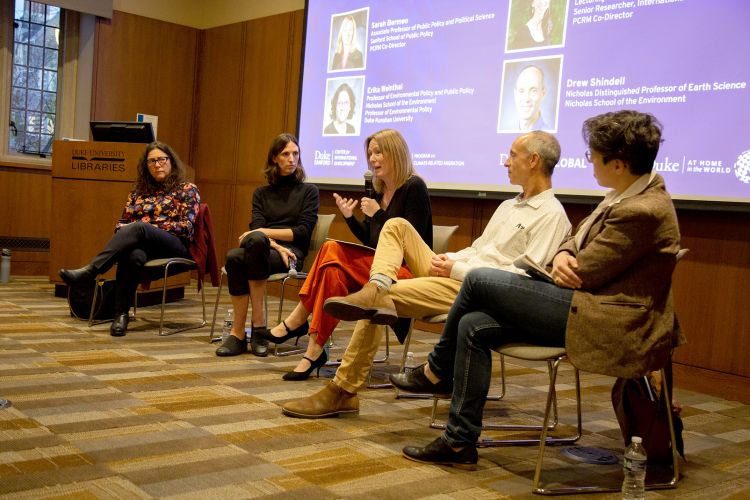
Climate change is already forcing people to leave their homes, and millions more will follow in the years to come.
The Intergovernmental Panel on Climate Change found 3.3 to 3.6 billion people are highly vulnerable to climate change because of their location and circumstances.
Duke University is responding. Reflecting the Duke Climate Commitment, scholars have launched a new Program on Climate-Related Migration, working on transdisciplinary research to better understand the complex links between climate change and human mobility, and to inform policies that can help.
The co-directors of the new program, Sarah Bermeo and Kerilyn Schewel, joined fellow Duke scholars scholars Erika Weinthal and Drew Shindell in a conversation moderated by immigration reporter Dara Lind.
Here are excerpts:
WHY CLIMATE-RELATED MIGRATION RESEARCH IS IMPORTANT
Sarah Bermeo: “With the amount of climate change we are experiencing, some places will not be livable. Lives will be affected. Often the poor and disadvantaged will be affected most. We have to define the problem of climate-related migration and then get to solutions.”
Keriyn Schewel: “We need to get over the question of whether migration is good or bad, but rather how we deal with it.”
FACTORS INFLUENCING CLIMATE-RELATED MIGRATION
Erika Weinthal: “It is easy to fall into the narrative and assume that only climate-related events drive people to move, but it is important to understand how they interact with political economy considerations, such as in Syria.”
Schewel: “It can be hard to decipher slow climate risk onsets and ways to assist migrants in those settings. In cases of natural disaster, it’s more clear how to respond. We need to think of all of the legal pathways to facilitate people on the move and holistic strategies to respond to changing migration systems.”
Bermeo: “People leave their homes because of climate, but that is not why they leave their countries. There is external migration (outside of a country) when affected persons cannot find internal solutions (inside a country). One of the big problems is we don’t know how to quantify this migration. We don’t have data on climate-related migration. How do you build systems, then? We need to bring in natural sciences combined with social sciences and demographers; an interdisciplinary approach is the only pathway forward.”
TOOLS THAT CAN ADDRESS CLIMATE-RELATED MIGRATION
Drew Shindell: “We need to use a combination of earth systems observations and model projections to quantify areas that are more vulnerable. There are systems to look at polar ice sheets that can be used to look at climate-related migration. Through projections, we can also see that some areas are increasingly becoming too hot for people to live. We can use projections and data on current trends for policy and economic analysis.”
Weinthal: “There have been consistent warning trends and prediction from climate data for decades. But we are not quantifying how many people are on the move. Depending on politics at the time in a place, numbers can shift at any time. There are more variables that come into play with climate-related migration data. We should analyze climate data alongside information about economic resources and policies.”
Schewel: “Qualitative data is important to understand the decision criteria for migrants to support adaptation strategies. This means gathering information about how populations affected perceive climate change and how they decide where to stay or go.”

POLICY SOLUTIONS FOR CLIMATE-RELATED MIGRATION
Schewel: “Participatory approaches involving local communities are important to learn about effective adaptation strategies. Partnerships with local think tanks who have knowledge of countries can craft more practical policies.”
Bermeo: “We need to think about long-term solutions as well as policy quick wins. For example in Central America, invest in rural farmers and climate-smart agriculture to reduce the need to migrate from that region. Investing in adaptation in fragile regions could have short-term impacts for those who do not want to leave but are forced to go.”
Panelists:
Sarah Bermeo
Sarah Bermeo is a political economist and associate professor of public policy and political science in the Sanford School at Duke University, director of Graduate Studies (DGS) in the Master of International Development Policy (MIDP) program and co-director of PCRM. Her research lies at the intersection of international relations and development.
Kerilyn Schewel
Kerilyn Schewel is co-director of PCRM, a lecturing fellow at the Duke Center for International Development and senior researcher at the International Migration Institute. Her research examines how processes of development reshape patterns of human migration.
Erika Weinthal
Erika Weinthal is professor of environmental policy and public policy at the Nicholas School of the Environment and professor of environmental policy at Duke Kunshan University. Weinthal specializes in global environmental politics and environmental security with a particular emphasis on water and energy.
Drew Shindell
Drew Shindell is Nicholas Distinguished Professor of Earth Science at the Nicholas School of the Environment. He studies climate change, air quality, and links between science and policy.
The Duke Program on Climate-related Migration is coordinated through the Duke Center for International Development (DCID) with support from the Duke Office of Global Affairs.